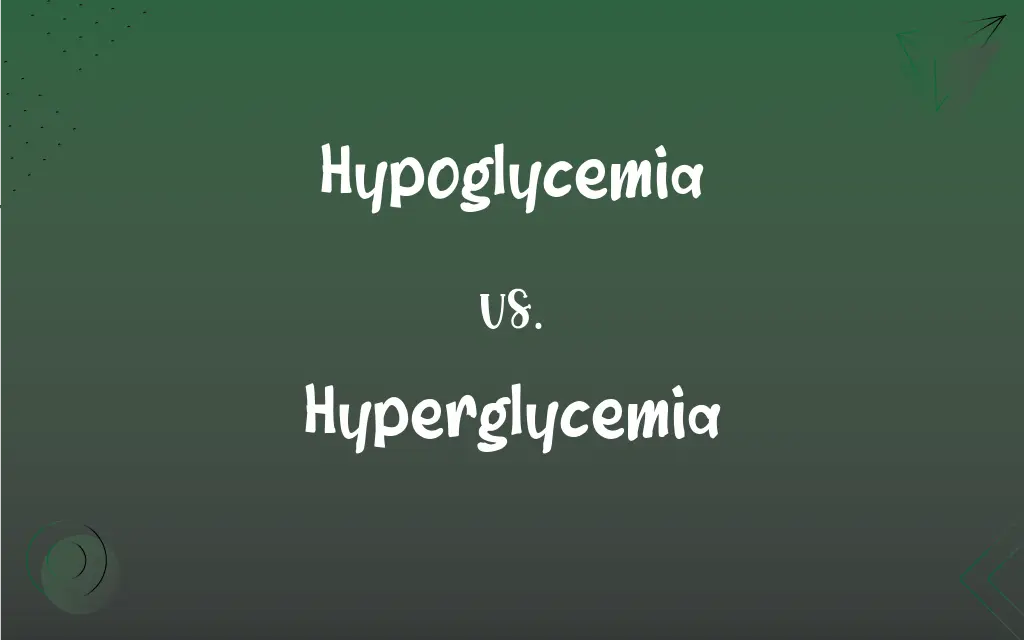Hypoglycemia vs. Hyperglycemia: What's the Difference?
Edited by Janet White || By Harlon Moss || Updated on October 28, 2023
Hypoglycemia means low blood sugar levels, while hyperglycemia means high blood sugar levels.

Key Differences
Hypoglycemia refers to the condition where there's an abnormally low level of glucose in the bloodstream. In contrast, hyperglycemia denotes an excessively high level of glucose in the bloodstream.
Hypoglycemia can result from taking too much insulin, skipping meals, or excessive physical activity. On the other hand, hyperglycemia can be a result of eating too much, insufficient insulin, or stress.
Symptoms of hypoglycemia can include shaking, sweating, rapid heartbeat, and confusion. Whereas, symptoms of hyperglycemia encompass frequent urination, increased thirst, fatigue, and blurred vision.
Untreated hypoglycemia can lead to unconsciousness or seizures. In contrast, prolonged hyperglycemia can result in long-term complications like nerve damage, kidney disease, and cardiovascular issues.
Hypoglycemia requires quick action, typically consuming a source of fast-acting sugar. On the contrary, hyperglycemia often necessitates insulin or other medication adjustments alongside hydration.
ADVERTISEMENT
Comparison Chart
Definition
Low blood sugar levels
High blood sugar levels
Common Causes
Too much insulin, skipped meals
Insufficient insulin, overeating
Typical Symptoms
Shaking, confusion, rapid heartbeat
Thirst, frequent urination, fatigue
Potential Complications
Seizures, unconsciousness
Nerve damage, kidney disease
Immediate Treatment Options
Fast-acting sugar
Medication adjustments, hydration
ADVERTISEMENT
Hypoglycemia and Hyperglycemia Definitions
Hypoglycemia
Hypoglycemia is a condition characterized by abnormally low blood glucose levels.
She fainted because of hypoglycemia after skipping her meals.
Hyperglycemia
Hyperglycemia denotes elevated blood sugar levels beyond the normal range.
Missing his insulin shots resulted in hyperglycemia.
Hypoglycemia
Hypoglycemia denotes a situation where blood sugar drops below the body's required level.
He always carries candy to combat sudden bouts of hypoglycemia.
Hyperglycemia
Hyperglycemia is a situation where the body has more glucose in the blood than it can handle.
After indulging in too many sweets, he experienced hyperglycemia.
Hypoglycemia
Hypoglycemia signifies insufficient glucose concentration in the blood.
Diabetic patients must monitor their blood sugar levels to prevent hypoglycemia.
Hyperglycemia
Hyperglycemia refers to a condition where there's an excessive amount of glucose in the bloodstream.
Uncontrolled diabetes can lead to hyperglycemia.
Hypoglycemia
Hypoglycemia is a state where the bloodstream lacks adequate glucose to fuel the body.
After running a marathon without proper sustenance, she experienced hypoglycemia.
Hyperglycemia
Hyperglycemia represents a surge in blood sugar that can lead to various complications.
Ignoring symptoms of hyperglycemia can be detrimental to health.
Hypoglycemia
Hypoglycemia represents a decrease in blood sugar to levels that can impair function.
Due to hypoglycemia, she felt dizzy and disoriented.
Hyperglycemia
Hyperglycemia signifies a higher than normal concentration of glucose in the blood.
Prolonged stress can be a contributing factor to hyperglycemia.
Hypoglycemia
An abnormally low level of glucose in the blood.
Hyperglycemia
The presence of an abnormally high concentration of glucose in the blood.
Hypoglycemia
(pathology) A too low level of blood glucose.
Hyperglycemia
(pathology) An unusually high concentration of sugar in the blood
Hypoglycemia
Abnormally low blood sugar usually resulting from excessive insulin or a poor diet
Hyperglycemia
Abnormally high blood sugar usually associated with diabetes
FAQs
What causes hyperglycemia?
Causes include insufficient insulin, overeating, or stress.
Is hypoglycemia exclusive to diabetics?
No, while common in diabetics, hypoglycemia can occur in non-diabetics as well.
How is hypoglycemia treated?
Hypoglycemia is typically treated by consuming a source of fast-acting sugar.
Can stress cause hyperglycemia?
Yes, stress can elevate blood sugar levels, leading to hyperglycemia.
Can dehydration lead to hyperglycemia?
Yes, dehydration can cause blood sugar to concentrate, leading to hyperglycemia.
How quickly can hypoglycemia develop?
Hypoglycemia can develop rapidly, especially in response to certain triggers.
How can I prevent hypoglycemia?
Regularly monitoring blood sugar levels, eating balanced meals, and adjusting insulin doses can help prevent hypoglycemia.
What happens if hypoglycemia is not addressed?
Untreated hypoglycemia can lead to unconsciousness, seizures, and even death.
Are there foods that can cause hyperglycemia?
Foods high in simple sugars or carbohydrates can contribute to hyperglycemia if consumed in large quantities.
Can hypoglycemia be dangerous?
Yes, if untreated, hypoglycemia can lead to unconsciousness or seizures.
Are the symptoms of hypoglycemia and hyperglycemia similar?
No, hypoglycemia can cause shaking and confusion, while hyperglycemia can cause thirst and frequent urination.
How long does it take for hyperglycemia to become dangerous?
Prolonged periods of hyperglycemia, often days to weeks,
What is hypoglycemia?
Hypoglycemia is a condition where blood sugar levels drop below the normal range.
What is hyperglycemia?
Hyperglycemia is a condition where blood sugar levels rise above the normal range.
How is hyperglycemia managed?
Hyperglycemia often requires insulin or other medication adjustments and hydration.
Can hyperglycemia lead to long-term complications?
Yes, prolonged hyperglycemia can cause nerve damage, kidney disease, and more.
What are some common causes of hypoglycemia?
Overdosing on insulin, skipping meals, or excessive physical activity can cause hypoglycemia.
Is frequent urination a sign of hyperglycemia?
Yes, frequent urination is a common symptom of hyperglycemia.
About Author
Written by
Harlon MossHarlon is a seasoned quality moderator and accomplished content writer for Difference Wiki. An alumnus of the prestigious University of California, he earned his degree in Computer Science. Leveraging his academic background, Harlon brings a meticulous and informed perspective to his work, ensuring content accuracy and excellence.
Edited by
Janet WhiteJanet White has been an esteemed writer and blogger for Difference Wiki. Holding a Master's degree in Science and Medical Journalism from the prestigious Boston University, she has consistently demonstrated her expertise and passion for her field. When she's not immersed in her work, Janet relishes her time exercising, delving into a good book, and cherishing moments with friends and family.































































